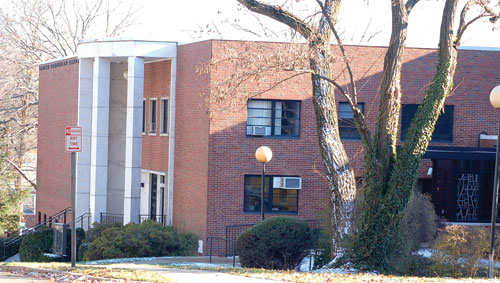.jpg)
Teaneck—In the 1930s, the phrase “Jewish Center” meant something other than just a part of a shul’s name. It called to mind a recreational, social, spiritual and educational space for Jews of all ages to get together, not just to daven and learn, but also to socialize and exercise. Jewish Centers developed all around the country at the time largely because non-Jewish society didn’t fully accept Jews, so Jews therefore needed to build their own institutions for the large influx of immigrants and first-generation Americans who needed safe spaces to spend time.
During the following generations, as Jews began to be more accepted in America, the Jewish Center concept began to wane as observant Jews began to affiliate with shuls within an eruv and closer to their homes. At the same time, Jews also began to commonly use municipal, private or corporate facilities for exercise and team sports, as they became more acclimated and accepted in suburban communities. Jewish Centers then started to be repurposed either as shuls or non-denominational community centers, but often not both.
The Jewish Center of Teaneck (JCT) was one such institution that was built in 1933 to house a wide variety of Jewish events, complete with an indoor swimming pool, exercise rooms and team sports courts. “However, in the 1960s and 70s, shuls locally were overwhelmed with lifecycle events, and the JCT, with 60,000 square feet of usable space, switched to a more synagogue and simcha focus and put health and wellness on the back burner,” said Rabbi Lawrence Zierler, JCT’s rabbi since 2006.
By the 1990s, however, the community in Teaneck became replete with synagogues, so JCT was forced to go through another period of transition as it searched for an identity and a place in the community landscape. After several affiliations over its 80-year history, it settled on a Modern Orthodox identity, with a mechitza returning to its main sanctuary two and-a-half years ago. According to Rabbi Zierler, “The mechitzah was ‘introduced’ and ‘initiated’ into the main Sanctuary, replacing its former family/mixed pews arrangement, making the Jewish Center’s synagogue entity fully Orthodox.”
Now, through board retreats and a dynamic rabbi who has experience working in Jewish communal service (Zierler was previously an associate executive director at the Cleveland JCC), the JCT is renovating and working to reclaim its original purpose as an exercise and wellness center for the community.
“There is a need for this kind of thing in this community.” Zierler said. “There is a need to provide health and wellness services around the need for recreational and social opportunities, for all ages; for children, their parents, and for seniors. It makes good financial sense for us and it’s good for the community.”
“We are different from most [health and wellness facilities] in that we will be gender sensitive, with single sex hours for both swimming and exercising,” continued Zierler. “Issues of gender sensitivity have been taken into consideration as the space is repurposed.”
JCT will also be functional and au courant in terms of its offerings, and while some of the JCT programs have previously been managed by contractors, the fitness services will now managed entirely by JCT staff. JCT has built up a staff of personal trainers, because studies have shown that people do better with exercise when they are committed to showing up. “There will also be a dance studio, barre classes, a TRX room, a rigorous workout room, Aquacize, yoga, boot camp for both adults and children, in addition to our basketball program,” said Zierler.
Many of the sports and wellness classes are currently on an “a la carte” or fee for service model, and one can now purchase a family pool pass for $250 a year.
The Center, while maintaining a busy schedule of daily Orthodox minyanim, also hosts a Scouts program, a pre-school that will continue to be run by Shalom Yeladim, and various other classes, as well as incubating Yeshiva Heichal Hatorah, a boys’ high school. JCT also continues to rent out rooms for simchas. At least 1,000-1,500 people are in the building each week, but there is room for up to 2,500, Zierler said. There is ample parking available in lots and on the street outside.
While classes are already up and running, the new space will be ready for its grand re-opening in January. “The best thing is that we are offering a service to the community, and we don’t have to compete with other shuls in order to do this,” said Zierler. “We’re simply reclaiming our original purpose.”
For more information, visit http://www.jcot.org.
By Elizabeth Kratz











